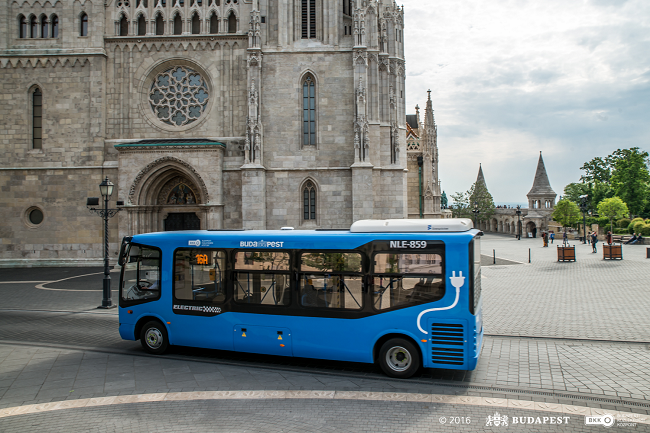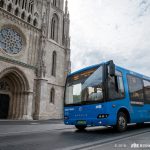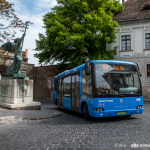
The mobility manager of the Hungarian capital, BKK Centre for Budapest Transport, was commissioned by the Municipality of Budapest to improve the service quality level of public transport. BKK and its service providers have recently put into service 20 brand new, barrier-free buses on several routes. A total of 15 Mercedes Conecto G articulated, low-floor, air-conditioned buses started passenger service on 1 May 2016 in South Budapest operated by VT-Arriva while the first five of C68E Modulo electric buses entered service on 30 April 2016 on lines 16A and 116 serving the Castle District in Buda. Fifteen more vehicles of this type will follow to complete the fleet of electric, accessible, air-conditioned midi-buses to be operated by BKV, the Budapest Transport Company.
The low-floor, electric buses are 8 metres long with a passenger capacity of 41 (or 37, if a wheelchair passenger is on board) based on capacity calculation with 4 passengers/m2. In addition to having less environmental load than traditional fuel -or hybridpowered buses, the operation of the zero-emission fleet is more cost effective.
![]()
In line with the sustainable transport development strategy of the Municipality of Budapest, the Budapest Transport Company has for years included in its action plan the assessment of the operation, the compatibility with the rest of the fleet and the overall suitability of fully electrically powered buses under the professional guidance of BKK, the transport organiser. In 2015, the opportunity arose to procure 20 new, modern, Modulo Medio Electric type zero-emission electric vehicles through a non-repayable grant in the amount of some 4 billion Hungarian Forints (ca. 16 million Euros) by the Ministry of National Economy.
The Modulo C68E buses have been developed and manufactured entirely in Hungary using an innovative modular construction method and composite materials for the bodywork. The manufacturer will supply a total of 20 fully electric vehicles along with charging poles. BKV joined the midi-bus project at the development and testing stage and as a result gained invaluable experience about the new technology and at the same time has effectively assisted the supplier in designing solutions that suit the requirements of passengers in Budapest to a greater extent.
![]()
The new Mercedes Conecto G buses are equipped with Euro VI diesel engines, saving 62-87% CO2, 88-95% NMHC, 94-97% NOx and 96-99% PM emission compared to the replaced Ikarus buses which were equipped with Euro 0-Euro II diesel engines. With the arrival of the new buses and the reallocation of buses among different lines, the accessibility of public transport will improve throughout the city.
While in 2010 only 25% of the buses were low-floor, today more than 80% of buses serving public transport lines in Budapest are now accessible while at weekends only low-floor, articulated buses are operating to facilitate the barrier-free transport of elderly, wheelchair and baby-carriage passengers and also of those with reduced mobility.
Between 2011 and 2016, 300 second-hand and 600 new buses were procured by BKK and its operators. The arrival of new buses decreased the average age of the bus fleet from 17.89 years to 9.49 years. This outstanding result will contribute to a sustainable, liveable, attractive and healthy urban environment in Budapest, as it is stated in the Balázs Mór Plan, the first SUMP based mobility plan of Budapest.
Contact :Tamas Kajdon

